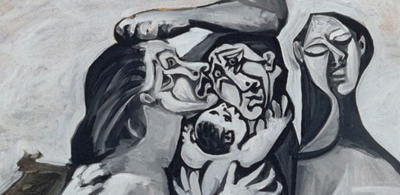At the Guggenheim: RUSSIA!
RUSSIA! a massive exhibition covering 900 years of Russian history, is now running at the Guggenheim Museum in New York City until January 11th, 2006.
While the show includes everything from 13th-century religious icons to the most current artistic expressions coming out of the country, what I personally find most interesting are those paintings and artistic expressions that were kept from us due to Cold War politics.
As the museum itself put it, “RUSSIA! seeks to reveal the pluralism of Soviet art in order to call into question one of the most lasting mythologies of Russia in the West – namely that its art was either exclusively rooted in the mandates of the regime or against the state altogether.”
Many will be surprised by the technical prowess and emotive impact of the paintings on display from the Soviet and Stalin-era Socialist Realism periods. We rarely saw these works in the West, and when we did they were scornfully mocked and dismissed as mere propaganda. The Guggenheim exhibit shows us that some of these paintings were also great works of art – on occasion rivaling and outshining the best from Europe and America.
One of the artists well represented in the exhibit is Gelii Korzhev, and his Raising the Banner is a rousing portrayal of rebellion every bit as stirring as Eugene Delacroix’s Liberty Leading the People. Moreover, Korzhev’s painting is a contemporaneous image, and one can imagine such a scene at nearly any anti-globalization demonstration taking place around the world today.
Another noteworthy painting by Korzhev to be found in the exhibit and its companion catalog is a remarkably sensitive and compassionate depiction of a scarred Soviet soldier – a veteran of combat against the Nazis. The close up portrait reveals the soldier lost an eye, but the sitter’s stoicism tells of a spirit left undiminished.

Mikhail Shwydkoi, head of the Federal Agency for Culture and Cinematography in Russia, said “With this exhibition, Americans will understand us,” and such an understanding is long overdue. If you can’t get to the Guggenheim, you owe it to yourself to acquire the remarkable catalogue for this exhibit – a book that belongs in everyone’s library.


